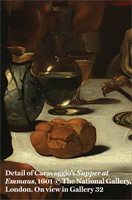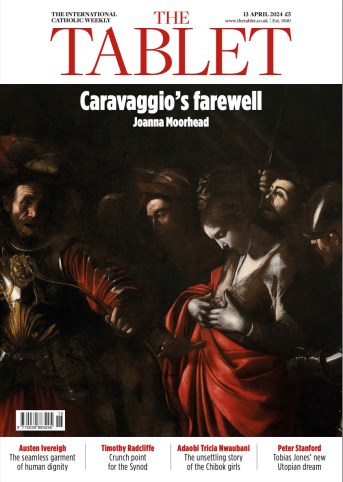The exclusion of divorced and remarried Catholics from Communion has distressed many of them and been at the centre of recent debate about their pastoral care. Here, in the week commemorating the Last Supper, a leading Aquinan theologian looks at the theology of St Thomas and his understanding of God’s forgiveness which always impels people towards Communion
A case can be made for saying that the summit of Aquinas’ theology is reached in his discussion on Sunday Mass! To claim so is not quite the same thing as saying that Sunday Mass – or the Liturgy, as the Second Vatican Council puts it – is the summit of the Church’s life.
But thinking out this claim about Thomas’ theology might help to bring to light the profound truth of what the council is saying, and save us from clutching at devotional straws to take the sting out of church rules that deprive people of full sacramental participation in Sunday Mass.
A summit is reached at the end of an upward journey. The discussion on the Eucharist does, in fact, come at the very end of Thomas’ Summa. There are a few other things that he might have added. But he stopped soon after completing his treatment of the Eucharist. He seems to have lost interest in writing any more theology and turned instead to a mystical preparation for his own death. Could it be that he realised that once he had said what he had to say about the Eucharist, there was nothing much more that needed to be said? He had saluted the Eucharist as viaticum in IIIa, q.73, a.4. He could gift those questions on the Eucharist to his students as a theological viaticum.
Nor is it fanciful to describe Thomas’ questions about the Eucharist at the end of the Summa as being a discussion about Sunday Mass. Thomas is most often remembered for his questions about how the mystery of the Eucharist is brought about by transubstantiation. But these are only some among the questions he raises about the sacrament.
He does indeed begin by asking about the core symbols and words in which the sacrament is given and how they serve the sacrament by being changed into the body and blood of Christ. He goes on from there to ask about what the sacrament does for those who receive it, about how they are to receive it, about the church ministers who do the consecrating and distributing of the sacramental bread and wine, about how the sacrament produces its effects as a sacrament that is a sacrifice. Eventually, having identified what is being done and who is doing it, the questions end with a careful examination of the full liturgical rite in which it all happens. The rite in which Thomas sees the Sacrament/sacrifice of the Eucharist being celebrated is nothing less than the Mass as Thomas knew it. Thinking about it is the culmination of his theology of the Eucharist. I would suggest it is the culmination of his entire theology.
The suggestion is being made on the basis of an understanding of the movement of Thomas’ theological thought in the Summa. His is a thinking that begins and ends with God. It proceeds through a progressive examination of general truths about God and about the world of God’s making, and in the light of these looks at the particular events in which these truths are historically realised – Creation, human origins, original sin, the giving of the law in the Old Testament, the giving of the grace of the Holy Spirit in the New Testament, and eventually the coming of Christ as the climax of God’s giving that finally brings all things back to God. All through the examination of God’s being and action, Thomas brings to light the components of the human response to it, particularly in the form of moral choices and virtuous activity. God gives himself ultimately and brings about the ultimate human response in Christ. Thomas’ Christology is completed in his questions about the sacraments because it is in them that Christ joins humanity to himself and humanity joins itself to him in the unity of his glorious body. This occurs pre-eminently in the Eucharist in which the sacraments reach their summit.
The Eucharist, then, is not just a devotion, one among others available for human sanctification. Thomas would be bemused by the kind of “spiritual bouquet” people used to give one another, in which Masses and Communions were listed and quantified side by side with Rosaries, Stations of the Cross, Hours of Eucharistic Adoration and even spiritual Communions.
Thomas does, of course, give devotion a place in his theology of the Eucharist. One of the wonders of his theological journey in the Summa is the way the progressive outpouring of the divine that he traces is seen to bring forth answering choices made by the human person. These take the form of virtues, faith, hope and charity, and moral virtues that have at their heart the practice of the virtue of religion, and occur in the exercise of various gifts and offices in the Church. Thomas deals with all of these in the Secunda Secundae of the Summa. He then shows in the Tertia Pars how they reach their fullness in Christ’s humanity. In the sacraments, through which Christ unites humanity to himself, they become the human response to the grace of Christ. Thomas sometimes groups them under cultus, worship. They are a participation in Christ’s own worship. His sacrifice is sacramentalised in the Eucharist and in it the worshipful response of Christians to the grace of God is made to be Christ’s own worship. So, the pattern of things coming down from God, in a movement that theology comes to call grace or sanctification, and of things going back to God, in a movement called worship or devotion, reaches its sacramental fullness in the Eucharist.
The Eucharist, in this view, is the summit of the coming out of all things from God and their return to God in Christ.
There are historical grounds for having the term Mass come to express the upward movement of the Eucharist and the term Communion its downward. It has sometimes led to these two being considered in Catholic thinking as separate spiritual exercises. Thomas makes no such separation. And that was in spite of the fact that in his day more and more of the faithful were attending Mass without receiving Communion. Given those circumstances, it was theologically daring of Thomas to argue, as he does, that it is good for people to receive Communion every day – and that meant going to Mass every day. The sacrament being celebrated in the Mass is the Sacrament of Communion.
It is in receiving the body and blood of Christ that the devotion of God’s people is caught up in the worshipful self-giving of Christ to God, in which all Creation finally returns to God. Taking full sacramental part in the Eucharist is not a devotional act that can be ranged alongside others and maybe substituted by others. It is the summit of the way the mystery of God works itself out in the universe.
The mystery happens whenever the Eucharist is celebrated. The fact that some individuals may come to the sacrament in a state of sin, and are therefore cutting themselves off from sanctification and worship, does not take away the reality of the Eucharist. Thomas notes that, unlike the other sacraments that are celebrated for a particular individual, the Eucharist sacramentalises the saving sacrifice of Christ as it brings salvation to all the redeemed. What it builds up is the Church, not only this or that individual Christian.
It is in this perspective that Thomas employs an Augustinian distinction between receiving the Eucharist sacramentally and receiving it spiritually. Augustine was not thinking about what would later come to be called spiritual Communion. He wanted to say – and Thomas follows him in this – that the full sacramental reality of the Eucharist can be there, but if a participant is not making the sacrament a personal upward movement of faith, love and worship, he or she does not receive the spiritual reality of the Eucharist. The Eucharist is received sacramentally but not spiritually. There is no envisaging here of spiritual Communion as an alternative to sacramental Communion. Spiritual Communion is sacramental Communion received gracefully.
Where Thomas does provide a line of thinking that would eventually be called on to justify the devotional practice called spiritual Communion is in his remarks about the desire, votum, for the Eucharist. He looks at situations in which people cannot physically receive the sacrament and allows that the desire for it will give them the inner reality of the sacrament. But he carefully remarks that one cannot have that desire for the Eucharist if one is not ready to receive sacramentally when the occasion presents itself. Spiritual Communion as an excuse for doing without sacramental Communion would not make sense to St Thomas Aquinas.
There are other obstacles to full sacramental participation in the Eucharist besides physical impossibility. At one extreme there is the obstacle of serious sin. At the other there are ecclesiastical regulations such as the eucharistic fast. Thomas is clear that people in a state of sin should not receive the sacrament; to do so would be to profane the Eucharist and so add sin to sin. And yet he holds that desire for the sacrament takes away sin, and he will even allow that, in certain circumstances, serious sin is taken away by actual participation in the sacrament. The forgiving grace of God is always impelling people towards partaking of the Eucharist. This is also why Church regulations such as the eucharistic fast can be easily dispensed.
Then Thomas deals with a case that falls between these two extremes. It is the question of how a celebrating priest acts towards “public sinners” who present themselves for Communion. Thomas offers a solution that is quite nuanced. But it does include this remarkable statement: “But if they be not open sinners, but occult, the Holy Communion should not be denied them if they ask for it. For since every Christian, from the fact that he is baptised, is admitted to the Lord’s table, he may not be robbed of his right, except from some open cause. Hence on 1 Corinthians 5:11, “If he who is called a brother among you,” etc., Augustine’s gloss remarks: ‘We cannot inhibit any person from Communion, except he has openly confessed, or has been named and convicted by some ecclesiastical or lay tribunal’ “ (IIIa, q.80, a.6). Finally it must be noted that, for Thomas, all obstacles to Communion, apart from refusal to repent of serious sin, are removed when the person asking for Communion is in danger of death.
People engaged in contemporary debates about matters such as access to the Eucharist for divorced and remarried Catholics may well look at and argue about how Thomas deals with practical issues concerning full sacramental participation in the Eucharist. What is being suggested here, however, is that his contribution to such debates must lie on a much deeper level than that of casuistical niceties. What he provides is an understanding of the Eucharist that sets it not just at the heart of human spirituality and devotion but at the very summit of the divine mystery that comes forth from God and returns to God.
The entry of humans into this summit of mystery can only take forms and be regulated by canonical procedures that measure up to the mystery such as God makes occur in the Eucharist.
* Liam G. Walsh is a Dominican of the Irish Province and teaches theology at the Studium in St Saviour’s, Dublin.





 Loading ...
Loading ...
What do you think?
You can post as a subscriber user...
User Comments (2)
I cannot honestly see what this article has to do with divorced and remarried Catholics receiving communion except to say that most adults Catholics are scandalized by the Church's present exclusionary position on this matter.